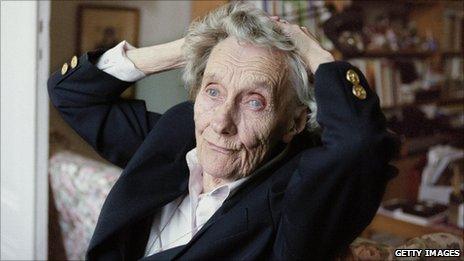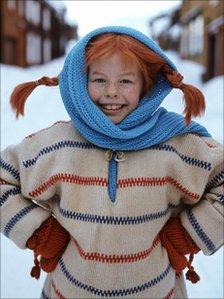The Pippi Longstocking legacy
- Published

Astrid Lindgren was sympathetic to screen adaptations of her famous character
This week Sweden celebrates the life of the writer Astrid Lindgren by awarding the annual prize for children's literature set up in her name, external.
But nine years after Lindgren's death, what is the legacy of her most famous creation Pippi Longstocking - and what do family and fans think of rumoured new plans to make her a story into a Hollywood film?
The flame-haired Pippi with the sticky-out pigtails is the most successful character in a series of books created by Lindgren for her daughter Karin Nyman.
'The very first moment when the character was created was when I was a child, I was asking my mother to tell me a story because she was good at telling stories," says Nyman.
"One particular evening I was ill in bed, and I probably had been asking and asking… so she said in desperation: 'What should I tell you now?'
"I just said this curious name Pippi Longstocking to attract her, and she was triggered by that silly name. And she invented a story this evening, and went on telling me about Pippi Longstocking."
Pippilotta Delicatessa Windowshade Mackrelmint Ephraim's Daughter Longstocking, or Pippi for short, is the strongest, kindest and richest girl in the world.
She lives all alone in a small Swedish village with her monkey Mr Nilsson and Little Old Man her pet horse. All of Pippi Longstocking's adventures are with her friends in tow, Tommy and Annika.
Many in Sweden look on the character as a national treasure. Dr Ulla Lundqvist has even made Pippi her life.
Dr Lundqvist wrote her PhD thesis on the character, who she had loved since reading her stories as a child.
"To me, when I met her, she was just a very funny companion, who dared to do everything that I dared not to do," says Dr Lundqvist.
"She exerted herself, she was self-reliant and strong and very generous and kind, and for the reading child the generosity, the humour, the wittiness, the adventure, is the most important thing.
"As a grown-up person I have found other things in her. She symbolises the emancipation of women. It is very important that she is a girl. The strongest child in the world is a girl, and she came out of the blue to my generation, and we are also the first emancipated generation in Sweden."
Strong trademark
There have been many adaptations of the Pippi stories for the screen over the years, starting with a movie in 1949.
Now there is speculation another cinema version is being planned under the directorship of Debra Granik, maker of recent Oscar contender Winter's Bone.

Inger Nilsson played Pippi in a Swedish TV version of Pippi in 1969
Nyman knows her mother was open to using different mediums to bring Pippi to life. However she feels children and adults should be free to conjure up their own interpretations from the books.
"Probably in my heart I would have liked her to stay in the books, but I know Astrid, my mother, thought that if children find it fun to see her in a play or in a movie then they should have the opportunity to do that," she says.
"But she herself could not imagine the volume of the thing it has become."
Saltkrakan AB is the sole owner of all rights associated with the authorship of Lindgren. It was set-up by Lindgren's children and grandchildren.
The company is managed by Nyman's son Nils, who believes it is important not to dilute the values represented in Lindgren's work.
"Her well-known characters are some of the strongest and most appreciated trademarks not only in Sweden but also internationally," he says.
He receives a high number of TV film requests but only a very small percentage of these are made.
One of these was from famed animator Miyazaki, who travelled to Sweden to meet with Lindgren. She turned down the project.
"The Miyazaki project was denied by Astrid Lindgren herself many years ago and perhaps she regretted that later," says Nils Nyman.
"We cannot comment on film requests that are current in some way. But in general, for film adaptations, we look for people that have a love for the story to be told and share the same values with Astrid Lindgren."
Inger Nilsson was the actress who played Pippi in the Swedish-produced TV series during 1969, which was later re-dubbed into English, and released as four feature films in 1969 and 1970.
Nilsson says Pippi was part of her life for three years, and as everyone still talks about the character, she is still with her says she is recognised all the time.
Karin Nyman and Dr Lundqvist say they don't mind this TV interpretation but they have choice words about the others and are wary about another film.
"There was an American Pippi Longstocking movie in the eighties. A bad one, so why would we want another?," says Karin Nyman.
Dr Lundqvist was interviewed on Swedish TV about an animated film version 10 years ago. She wasn't happy about the portrayal.
"I said she [Pippi] was vulgar. She was not my Pippi. She has very few features of my Pippi."
So whether Hollywood is allowed to take-on a project or not, it better be prepared for some pretty strong reactions from Sweden.